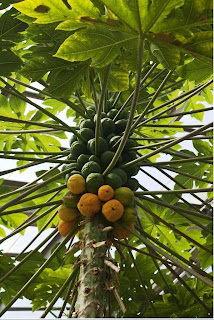On a 2 mile walk to work at a clinic in the nearby village called Kidia, I noticed an “alien” looking tree amongst the forest canopy. Turns out it was a papaya tree, and they happen to grow here natively throughout the village amongst banana, mango, and avocado trees to name a few. It’s truly the Garden of Eden here.
I have started teaching classes once per week to the mamas here about how to use foods that grow locally as medicine to treat and prevent infectious disease and several other chronic ailments. Papaya is well known for treating parasites, worms, and other gastrointestinal infections—one of the main health problems in Sub-Saharan East Africa. Papain is the main active constituent in Papaya, an enzyme that digests proteins in the gut when eaten without causing harm to the intestinal lining. The papain breaks down the protein in worms, physically denaturing and killing them while helping to flush them out of the body. The unripe fruit and the seeds contain the most papain.
“Green” or unripe papaya can be made into a salad commonly made in Thailand with tomato, carrot, peanuts, lime, chili, and usually fish sauce. In the version of the salad I made with the village mamas, I left out the fish sauce and added crushed fresh garlic, ginger, and a little honey for added health benefit. The garlic is antibacterial and ginger stimulates appetite and is known as nature’s best nausea treatment. The mamas and the watoto (kids) loved the new recipe.
The plan is to start creating local affordable medicinal food recipes like this to incorporate in the diet of school age children who most commonly have gastrointestinal infections, especially worms. Intestinal infections can cause a lot of damage to the health and development of children due to problems with malabsorption of nutrients and subsequent malnutrition leading to poor immunity.
Using food as medicine in Tanzania makes more sense than throwing drugs at a problem where they are often not affordable or available and may cause of number of adverse reactions. Furthermore, there are not enough doctors or qualified healthcare workers to manage medication so health education to prevent disease naturally makes more sense.
Mebendazole, a relatively harmless drug, is the common treatment for intestinal worms. It is given to most children every few months and is quite affordable here but not always available and does not prevent further infestations. The drug works by poisoning the worms. I have noticed here that the medication has been incorrectly dosed several times. Incorporating healthy antimicrobial foods into the diet can further prevent worms from making their home in the gut and can help clear them from the body between doses of Mebendazole. Papain is also available in many digestive aid supplement formulas but are not available in Tanzania—yet!
Future Food as Medicine classes in the village:
Processed Foods: The Effects of a “Civilized Western Diet” in Tanzania
Table Salt vs. Sea Salt: Thyroid Problems in Tanzania
Food Sanitation and Hygiene: From Seed to Mouth
Diet for Diabetes and Hypertension: The Reality in Tanzania
Future Public Health Education Classes:
HIV/AIDS prevention: “Prevention is Better than Cure”
Malaria, Immunity, and Artemesia
Women’s Health in Tanzania: The Foundation of the Family
What’s in the Water?
More to come!


No comments:
Post a Comment